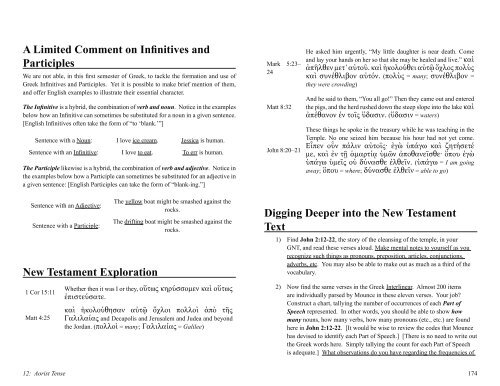Elementary New Testament Greek, 2014a
Elementary New Testament Greek, 2014a
Elementary New Testament Greek, 2014a
Create successful ePaper yourself
Turn your PDF publications into a flip-book with our unique Google optimized e-Paper software.
A Limited Comment on Innitives and<br />
Participles<br />
We are not able, in this rst semester of <strong>Greek</strong>, to tackle the formation and use of<br />
<strong>Greek</strong> Innitives and Participles. Yet it is possible to make brief mention of them,<br />
and offer English examples to illustrate their essential character.<br />
The Innitive is a hybrid, the combination of verb and noun. Notice in the examples<br />
below how an Innitive can sometimes be substituted for a noun in a given sentence.<br />
[English Innitives often take the form of “to ‘blank.’”]<br />
Sentence with a Noun: I love ice cream. Jessica is human.<br />
Sentence with an Innitive: I love to eat. To err is human.<br />
The Participle likewise is a hybrid, the combination of verb and adjective. Notice in<br />
the examples below how a Participle can sometimes be substituted for an adjective in<br />
a given sentence: [English Participles can take the form of “blank-ing.”]<br />
Mark 5:23–<br />
24<br />
Matt 8:32<br />
John 8:20–21<br />
He asked him urgently, “My little daughter is near death. Come<br />
and lay your hands on her so that she may be healed and live.” <br />
μ . <br />
. ( = many; =<br />
they were crowding)<br />
And he said to them, “You all go!” Then they came out and entered<br />
the pigs, and the herd rushed down the steep slope into the lake <br />
. ( = waters)<br />
These things he spoke in the treasury while he was teaching in the<br />
Temple. No one seized him because his hour had not yet come.<br />
<br />
μ μ μ <br />
μ . ( = I am going<br />
away; = where; = able to go)<br />
Sentence with an Adjective:<br />
Sentence with a Participle:<br />
<strong>New</strong> <strong>Testament</strong> Exploration<br />
1 Cor 15:11<br />
Matt 4:25<br />
The yellow boat might be smashed against the<br />
rocks.<br />
The drifting boat might be smashed against the<br />
rocks.<br />
Whether then it was I or they, μ <br />
.<br />
<br />
and Decapolis and Jerusalem and Judea and beyond<br />
the Jordan. ( = many; = Galilee)<br />
Digging Deeper into the <strong>New</strong> <strong>Testament</strong><br />
Text<br />
1) Find John 2:12-22, the story of the cleansing of the temple, in your<br />
GNT, and read these verses aloud. Make mental notes to yourself as you<br />
recognize such things as pronouns, preposition, articles, conjunctions,<br />
adverbs, etc. You may also be able to make out as much as a third of the<br />
vocabulary.<br />
2) Now nd the same verses in the <strong>Greek</strong> Interlinear. Almost 200 items<br />
are individually parsed by Mounce in these eleven verses. Your job?<br />
Construct a chart, tallying the number of occurrences of each Part of<br />
Speech represented. In other words, you should be able to show how<br />
many nouns, how many verbs, how many pronouns (etc., etc.) are found<br />
here in John 2:12-22. [It would be wise to review the codes that Mounce<br />
has devised to identify each Part of Speech.] [There is no need to write out<br />
the <strong>Greek</strong> words here. Simply tallying the count for each Part of Speech<br />
is adequate.] What observations do you have regarding the frequencies of<br />
12: Aorist Tense<br />
174


















